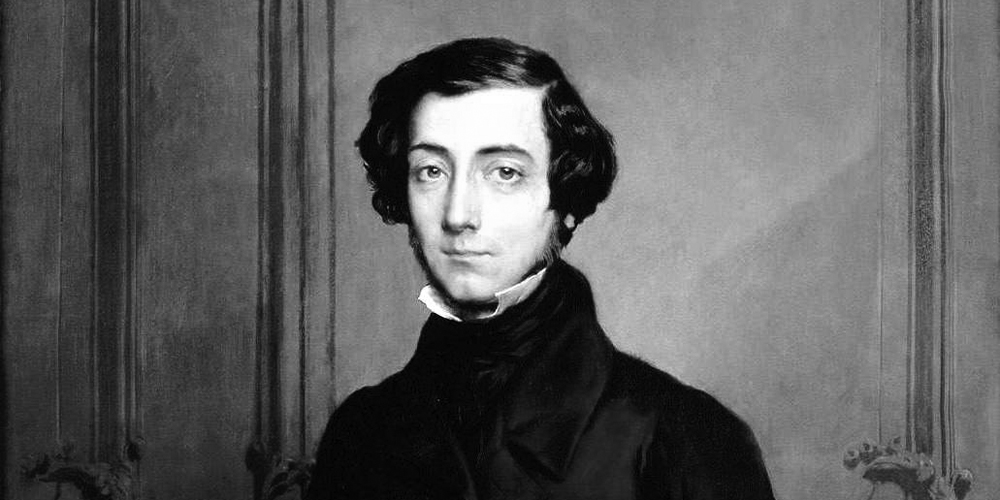Against a tyranny of the majority
MPs need to learn from the past and show some courage on Europe Holding up American democracy as an ideal is rather unpopular today – with good reason. Yet while the world anxiously awaits the global fallout of President-elect Trump coming...
MPs need to learn from the past and show some courage on Europe
Holding up American democracy as an ideal is rather unpopular today – with good reason. Yet while the world anxiously awaits the global fallout of President-elect Trump coming to office, it is worth remembering that the US democratic model has been admired since Alexis de Tocqueville back in 1835 for its strengths: representation of the people through elected chambers, a focus on the rule of law, a separation of powers, and the protection of basic liberties of speech, assembly and religion.
Like many liberal thinkers of his time, de Tocqueville was cautious about the newly emerging democratic world, and with good reason. Four decades before his visit to the United States, his home country France had attempted a transition to democracy through a brutal and bloody revolution. The new regime took little time to turn into one of the bloodiest dictatorships of the 18th century, turning on the very people it aimed to liberate and empower. Instead of a glorious new future for all, the French people experienced what de Tocqueville called the “tyranny of the majority”.
Almost two centuries later, the majority of countries in the world are democratic; in most European countries, my generation grew up with democratically elected governments. And perhaps democracies have become, as so many other things, a victim of their own success. We take them and the freedoms we have grown used to for granted, we forget that they do not sustain themselves. We forget that one on the biggest dilemmas of democracy is that it gives people the ability to destroy themselves.
While open, free and fair elections are the essence of every democracy, they are not enough to sustain them. The key difference de Tocqueville observed more than 200 years ago between the American and the French democratic systems was simple: the former was based on the rule of law, checks and balances, and transparent, strong institutions; the latter was mainly based on the will of the people , which, as its proponents saw it, could not fail. Tragically, history proved them wrong.
I have always struggled with the idea of referendums. In my home country Germany, the constitution, or Grundgesetz, does not allow them. This is because the German people learned their lessons from history.
The point of any parliamentary system is that most decisions which affect the government of a country are complex, and deserve proper informed debate, consideration of minute details and extensive scrutiny, all of which simply cannot be provided through a referendum. Referendums are a populist demagogue’s most powerful tool.
Democracies that are built to weather bad times are based on more than just the majority of votes – they are also rooted in strong institutions embedded in the culture, ambitions and values of a country. And in the UK, the oldest of liberal democracies, this institution is parliament.
One of parliament’s biggest decisions of this generation is of course going to be the vote on whether or not to trigger article 50.
Proper parliamentary scrutiny of the issue is most welcome. Since the referendum result, many claims of the leave campaign have been proven false, while many of the “scaremongering” claims of the remain campaign have turned out to be true. Firms are leaving or are considering leaving. Hate crimes are on the rise. According to a recent poll by the FT, one third of European citizens living in the UK are considering leaving within the next two years (I am one of them).
Yet much of the debate within Labour, and indeed more widely, operates under the illusion that the UK will somehow manage to “shape Brexit”. It will not.
Let’s be clear: Hard Brexit is not Theresa May’s government favourite option, it is the only option it has. A “soft” Brexit, in which the UK receives access to the single market, yet is allowed to impose certain limits on migration or shift to “freedom of movement for workers” may be a popular idea for groups such as Open Britain, but it is not within the British parliament’s gift to give. Instead, it will depend on 27 European member states who would all have to agree to grant Britain such a deal. And unsurprisingly to most European observers, most continental leaders actually meant it when they said that access to the single market would only come in exchange for contributions to the EU budget, compliance with most EU laws and, most importantly, freedom of movement.
So there is a reason why the government refuses to make clear what Brexit actually means – as the fog is beginning to lift, the emerging future isn’t bright.
The referendum gave people a vote without knowing the alternative. Now the picture is becoming clearer: Choose hard Brexit, and all its disastrous economic and social consequences, or vote against triggering Article 50, remain in the EU, and re-establish Britain’s reputation as one of the world’s most open and tolerant societies.
Some have said that MPs have their own choice: Vote to leave the EU, and let the UK suffer an economic crisis; or vote to remain, and suffer a democratic one.
I disagree. The role of parliament is to scrutinize legislation and debate proposals. Elected parliamentarians have the duty to make informed decisions in the best interest of the country and the people they represent. This is how Britain “does” democracy. Sometimes, this means voting against the popular mood. The real crisis for democracy would be for parliament and MPs to bow to populism and ignore their constitutional purpose. Protecting the country from disastrous decisions based on ill-informed populism is part of that purpose.
For some, voting against triggering article 50 will take a lot of political courage; understandably, some MPs will worry about their chances of re-election. But leadership requires courage. As the former German President Walter Scheel, who died in August, once put it: “The task of a politician is not to gather public opinion and do the popular thing. It is their duty to the right thing, and to make it popular”.
MPs would do well to ponder those words before casting their votes.

